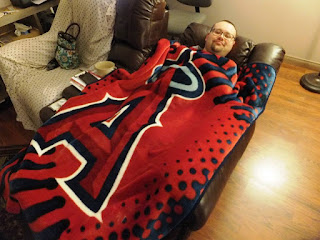Welcome to National Family Caregivers Month. What is a caregiver? Basically, if you're someone with special needs necessary for living a normal life, you will need someone to help you meet those needs. That is a caregiver (also called a carer in some parts of the world).While our blog focuses on disabilities, particularly mobility deficiencies, most of it is written by a caregiver with input by the one cared for (for the perspective of the person being cared for, you can check out Tim's series of posts called Cerebral Palsy Stories).
During this month, we'll be posting some articles about caregiving, what it is, how to do it, and how to pay for it. Our focus will be on persons needing help due to mobility issues.
Over the last month, we've covered what caregivers do, how caregivers need to put a little time aside to take care of themselves, and how to get a job as a caregiver. We'll end this with some strategies about how to pay for it.
Let's face it, caregiving is expensive. Figure at a bare minimum at least four hours per day. At a minimum, $15 an hour. Times that by how many hours a caregiver is needed each day, each week, each month...and you start to see just how much this is going to cost.
A lot, if not most, depend on a family member who will do it for free or at least cheaply. What that doesn't consider, though, it how much that family member must sacrifice in terms of time and money to get that job done...not to mention burn out, which can happen amazingly fast.
The solution, of course, is to get a professional caregiver or pay the family member a true wage, or a combination of both. This means you'll need to find a way to come up with that money.
Easiest, of course if you have a big hole burning in your wallet, is to just pay it out of your funds. There are very few people, abled or disabled, who can afford that however.
Another option, should you be able to take care of it before a disability sets in, is Long Term Care Insurance which you may be able to get through your employer or on your own through an insurance agent.
With this in place, you can get a daily stipend to pay for care should the beneficiary become disabled or even pay for assisted living or nursing home care but, once you're disabled, you will find it very hard to get anyone to underwrite you for this insurance.
That leaves us to relying on government programs to help pay.
Here in the United States, the main program for helping pay for a caregiver is In Home Support Services (IHSS) which is administered by each state, usually through a local county's health or welfare department, and is funded by a combination of federal, state, and county monies.
In our home state of California, you apply for IHSS through your county's health department. A social worker will be dispatched to interview you to see if your special needs qualify for assistance. If so, you will be given a number of hours that you qualify for. A worker can be hired (which can be a family member) and they will be paid for the number of hours worked, up to the number you were granted. The pay is just a little above minimum wage.
In theory, it sounds easy but finding a good, qualified worker can be a challenge. Aides must go through a one day training and pass a background check. Some county offices maintain lists of qualified workers that you can contact, interview, and hire.
You are in control of the hiring process and no one else is going to do it for you, which is where the challenge can come in. Also, if the person you hire doesn't work out, you have to start all over again. As they say, good help can be hard to find.
Many here prefer to go the family member route and that family member can be paid the full rate, somewhat easing the burden for them. A family member who is assigned as the caregiver will receive full pay, just as if they're a professional hired outside of the family, and also must go through the training and background check.
We live in California but a majority of states allow you to do this. From what I could find Alabama, Arizona, Colorado, Delaware, Florida, Hawaii, Kentucky, Minnesota, Montana, New Hampshire, New Jersey, North Dakota, Oklahoma, Oregon, and Wisconsin also allow family members to be paid as caregivers. Check your state or county's health department to see if that would apply to you, too.
If not, every state has some sort of payment for in home care but it may be an outsider that is the one to do that.
Beyond the government help, there are some charities such as Easter Seals and March of Dimes that can help, especially those with little or no income.
I hope you find this month's posts informative and helpful. Should you find yourself in the role of a caregiver, know that you are not alone and help is available but you may need to do a little digging to find it.
Darryl Musick
Copyright 2021 - All Rights Reserved

































_while_her_caregiver%2C_Maria.jpg)
